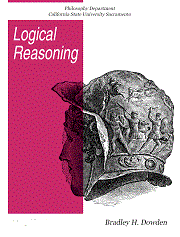
|
FreeComputerBooks.com
Links to Free Computer, Mathematics, Technical Books all over the World
|
|
- Title Logical Reasoning
- Author(s) Bradley H. Dowden
- Publisher: California State University Sacramento (2020)
- License(s): CC BY-NC-SA 4.0
- Paperback N/A
- eBook PDF (595 pages)
- Language: English
- ISBN-10: N/A
- ISBN-13: N/A
- Share This:

|
The goal of this book is to improve your logical-reasoning skills. Your logical-reasoning skills are a complex weave of abilities that help you get someone's point, generate reasons for your own point, evaluate the reasons given by others, decide what or what not to do, decide what information to accept or reject, explain a complicated idea, apply conscious quality control as you think, and resist propaganda. Your most important critical thinking skill is your skill at making judgments-not snap judgments that occur in the blink of an eye, but those that require careful reasoning.
You are not reasoning logically if, when you want a gorilla suit for a Halloween party, the first thing you do is search for the word "Gorilla" in the Yellow Pages of the telephone book, and the problem here is not that you used a telephone book instead of the Internet.
High-quality reasoning is called logical reasoning or critical thinking. Logical reasoning skills can be learned and improved. It is not a case of "Either you're naturally good at it or you’re not." Rather, every student is capable of reasoning well, and everyone is capable of improvement. The opposite of logical reasoning is uncritical thinking, examples of which are fuzzy thinking, believing what somebody says simply because they raise their voice, and narrowly thinking about a problem without bringing in the most relevant information.
This book is designed to engage students' interest and promote their writing abilities while teaching them to think critically and creatively. The author takes an activist stance on critical thinking, asking students to create and revise arguments rather than simply recognizing and criticizing them. His book emphasizes inductive reasoning and the analysis of individual claims in the beginning, leaving deductive arguments for consideration later in the course.
About the Authors- Bradley H. Dowden is an American philosopher and professor of philosophy at the California State University, Sacramento.
- General and Miscellaneous Mathematics
- Mathematical Logic - Set Theory, Model Theory, Proof Theory, Computability, etc.
- Discrete Mathematics
 Similar Books:
Similar Books:
-
 A Concise Introduction to Logic (Craig DeLancey)
A Concise Introduction to Logic (Craig DeLancey)
This book takes the unique approach of teaching logic through intellectual history; the author uses examples from important and celebrated arguments in philosophy to illustrate logical principles.
-
 Introduction to Mathematical Logic (Vilnis Detlovs, et al)
Introduction to Mathematical Logic (Vilnis Detlovs, et al)
This book explores the principal topics of mathematical logic. It covers propositional logic, first-order logic, first-order number theory, axiomatic set theory, and the theory of computability. Discusses the major results of Gödel, Church, Kleene, Rosser, and Turing.
-
 A Friendly Introduction to Mathematical Logic (Chris Leary)
A Friendly Introduction to Mathematical Logic (Chris Leary)
In this user-friendly book, readers with no previous study in the field are introduced to the basics of model theory, proof theory, and computability theory, leading to rigorous proofs of Gödel's First and Second Incompleteness Theorems.
-
 Simply Logical: Intelligent Reasoning by Example (Peter Flach)
Simply Logical: Intelligent Reasoning by Example (Peter Flach)
This book is an introduction to Prolog programming for artificial intelligence covering both basic and advanced AI material. A unique advantage to this work is the combination of AI, Prolog and Logic.
-
 An Introduction to Mathematical Reasoning (Peter J. Eccles)
An Introduction to Mathematical Reasoning (Peter J. Eccles)
The purpose of this book is to introduce the basic ideas of mathematical proof to students embarking on university mathematics.
-
 Mathematical Reasoning: Writing and Proof (Ted Sundstrom)
Mathematical Reasoning: Writing and Proof (Ted Sundstrom)
Help students to develop logical thinking skills and to develop the ability to think more abstractly in a proof oriented setting, develop the ability to construct and write mathematical proofs using standard methods of mathematical proof including direct proofs, proof by contradiction, mathematical induction, case analysis, counterexamples.





